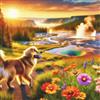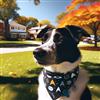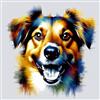1620s Dog Names - Page 3
Updated: July 11, 2024
Welcome to a unique collection of canine appellations that harks back to the early 17th century. Our list takes you on a historical journey, offering a glimpse into the past when naming traditions were distinctive and deeply rooted in the culture of the bygone era. These monikers are a perfect blend of the old-world charm and timeless elegance.
During the 1620s, dog names were greatly influenced by various factors such as social status, occupation, personal beliefs and local customs. These names are not just tags but a reflection of the dog’s purpose, the owner's profession or even their favorite pastime. Whether you're a history enthusiast, a lover of vintage or simply looking for a distinctive name for your furry friend, this page will serve as a treasure trove of inspiration.
Delve into the fascinating world of historical dog names and discover a name that resonates with the personality and spirit of your four-legged friend. After all, a name is a significant part of a pet’s identity and picking one from the 1620s is sure to make your pooch stand out in the crowd.
| Name | Reason to Choose |
|---|---|
| Keayne | After Robert Keayne, notable Boston merchant of the time |
| Kempe | After Kempe De La Pole, an early settler |
| Kester | A Scottish name from the era |
| Kingsley | Kingsley, meaning 'king's meadow', was a common English name in the 1620s |
| Kingston | Kingston, meaning 'king's town', was a common English name in the 1620s |
| Levi | This biblical name would be fitting for the religiously influenced 1620s |
| Liberty | Liberty was a valued virtue in the 1620s and would have been a suitable name for a dog |
| Love | A virtue name favored by Puritans |
| Loyal | A virtue name, reflecting the values of the era |
| Lyon | A surname prevalent in early colonial times |
| Marshall | A name meaning 'horse servant', a nod to the importance of horses in the era |
| Mercer | This was a common occupation in the 1620s, dealing in textiles |
| Mercy | Reflects the religious beliefs of the time |
| Merrick | Merrick, of Welsh origin meaning 'ruler of the sea', was a common name in the 1620s |
| Milton | John Milton, author of 'Paradise Lost', was a contemporary of the 1620s |
| Mordecai | Mordecai, a biblical name, was common during the 1620s |
| Myles | In memory of Myles Standish, English military officer |
| Nathaniel | Reflects the popularity of biblical names in the 17th century |
| Nehemiah | Nehemiah, derived from the Bible, was a popular name in the 1620s |
| Nevin | A Scottish name, common among immigrants of the era |
| Noble | A name embodying Puritan values |
| Nobleman | 'Nobleman', meaning a man of noble rank, was a common name in the 1620s |
| Obadiah | Hebrew names were popular in the 1620s |
| Obedience | Obedience, a virtue name, was in use during the 1620s, symbolizing compliance and submission |
| Observe | 'Observe', symbolizing careful attention, was a virtue name in the 1620s |
| Orion | Named after the constellation, reflecting the importance of astronomy in this era |
| Osgood | Meaning 'god is good', a religious name from the era |
| Parnell | A name of French origin, representing the diverse settlers of the era |
| Patience | A virtue name popular amongst Puritans |
| Piety | A virtue name that would be fitting for the era |
|
Suggest:
|
Submitted!
|
| 1 2 3 4 5 | |
Scientific Discoveries
| Name | Description |
|---|---|
| Boyle | Robert Boyle, a natural philosopher, chemist, physicist, and inventor, is the inspiration |
| Cassini | This name is in honor of Giovanni Domenico Cassini, a leading astronomer of the 17th century |
| Celsius | A nod to the Swedish astronomer Anders Celsius, who invented the Celsius temperature scale |
| Copernicus | In honor of Nicolaus Copernicus, whose heliocentric model revolutionized astronomy |
| Descartes | An homage to René Descartes, a key figure in the Scientific Revolution |
| Fahrenheit | Inspired by Daniel Gabriel Fahrenheit, the physicist and inventor of the mercury thermometer |
| Fermat | Inspired by Pierre de Fermat, a French mathematician who made significant contributions to calculus |
| Galileo | Named after the famed Italian astronomer and physicist Galileo Galilei, who made significant contributions in the 17th century |
| Galvani | This name is a nod to Luigi Galvani, who discovered animal electricity |
| Halley | Edmund Halley, who computed the orbit of the eponymous Halley's Comet, is the inspiration |
| Hertz | Heinrich Hertz, a German physicist, is commemorated with this name |
| Hooke | Robert Hooke, an English scientist, inspired this name with his law of elasticity |
| Huygens | Christiaan Huygens, a Dutch mathematician and physicist, lends this name its scientific significance |
| Janssen | Pierre Janssen, a French astronomer, is the inspiration behind this name |
| Kepler | Johannes Kepler, a key figure in the scientific revolution, is the inspiration behind this name |
| Kirchhoff | Gustav Kirchhoff, a German physicist, lends this name its scientific significance |
| Lavoisier | Antoine Lavoisier, the 'father of modern chemistry', lends this name its scientific significance |
| Leibniz | A tribute to Gottfried Wilhelm Leibniz, a German polymath and philosopher |
| Newton | Honors Sir Isaac Newton, whose laws of motion and universal gravitation were groundbreaking |
| Pascal | A nod to Blaise Pascal, who made significant scientific discoveries in the 17th century |
| Roemer | Ole Rømer, a Danish astronomer who made the first measurements of the speed of light, is the inspiration |
| Torricelli | This name pays homage to Evangelista Torricelli, who invented the barometer |
| Tycho | Tycho Brahe, a Danish nobleman and astronomer, gives this name its historical significance |
| Vesalius | In remembrance of Andreas Vesalius, a 17th century scientist known for his work in anatomy |
| Volta | In tribute to Alessandro Volta, who invented the electric battery |
|
Suggest:
|
Submitted!
|
Colonial Inspired
| Name | Description |
|---|---|
| Alden | Inspired by John Alden, a crew member on the Mayflower |
| Bradford | Inspired by William Bradford, a key figure in the Plymouth Colony |
| Brewster | After William Brewster, a Pilgrim leader and preacher |
| Charter | Many colonies were established with royal charters during this era |
| Colony | This name is a straightforward tribute to the colonial era |
| Cotton | After Cotton Mather, a socially and politically influential New England Puritan minister |
| Endeavor | This name signifies the courage and determination of the colonial settlers |
| Harvard | Harvard University was founded in this period |
| Hopkins | From Stephen Hopkins, a Mayflower passenger |
| Hutchinson | After Anne Hutchinson, a prominent figure in the Massachusetts Bay Colony |
| Jamestown | Named after the first permanent English settlement in the Americas |
| Mayflower | The ship that brought the Pilgrims to the New World |
| Pilgrim | This name honors the brave settlers of the New World |
| Plymouth | Plymouth Colony was the first successful colony in 1620 |
| Pocahontas | In honor of the Native American woman who played a key role in colonial history |
| Pocasset | A Wampanoag tribe in the area during colonial times |
| Providence | Providence, Rhode Island was founded in this era by religious exile Roger Williams |
| Prudence | This name recalls the virtue names common in the colonial era |
| Puritan | A nod to the religious movement that significantly influenced the 1620s |
| Quaker | Recognizing the Quaker religious group that founded colonies in the 1620s |
| Salem | After Salem, Massachusetts, founded in the 1620s |
| Squanto | Honoring the Wampanoag who assisted the Pilgrims after their first winter in the New World |
| Standish | Derived from Myles Standish, a military leader in Plymouth Colony |
| Wampanoag | The name of the Native American tribe that helped the Pilgrims survive their first winter |
| Winslow | Edward Winslow, one of the Pilgrim Fathers, inspires this name |
|
Suggest:
|
Submitted!
|
Literature Inspired
| Name | Description |
|---|---|
| Balthazar | Inspired by the character from 'The Merchant of Venice' by Shakespeare |
| Beatrice | Inspired by the character from Shakespeare's 'Much Ado About Nothing' |
| Benedick | Named after the character in 'Much Ado About Nothing' by Shakespeare |
| Caliban | Inspired by the character from 'The Tempest', a play by Shakespeare |
| Cordelia | A tribute to the character from 'King Lear', a Shakespearean tragedy |
| Cymbeline | Named after the title character from a lesser-known Shakespeare play |
| Desdemona | Character from 'Othello', a play by Shakespeare |
| Falstaff | A character from 'Henry IV', a historical play by Shakespeare |
| Guildenstern | Inspired by the character from 'Hamlet', a Shakespearean tragedy |
| Hamlet | In honor of the title character from one of Shakespeare's most famous plays |
| Hermia | Inspired by the character from 'A Midsummer Night's Dream' by Shakespeare |
| Iago | One of Shakespeare's most memorable villains, from 'Othello' |
| Lear | Paying homage to 'King Lear', one of Shakespeare's tragic figures |
| Lysander | A character from 'A Midsummer Night's Dream', a Shakespearean comedy |
| Macbeth | A character from Shakespeare's tragic play of the same name |
| Miranda | 'The Tempest' by Shakespeare, also features this character |
| Oberon | Named after the king of the fairies in Shakespeare's 'A Midsummer Night's Dream' |
| Orsino | Inspired by the character from 'Twelfth Night' by Shakespeare |
| Othello | Inspired by the tragic hero in Shakespeare's play 'Othello' |
| Portia | Character from 'The Merchant of Venice', a play by Shakespeare |
| Prospero | Inspired by the character from Shakespeare's 'The Tempest' which was written in the 1623 |
| Puck | A character from 'A Midsummer Night's Dream', another renowned Shakespeare play |
| Rosencrantz | Character from 'Hamlet', a tragedy by Shakespeare |
| Titania | Inspired by the queen of the fairies in 'A Midsummer Night's Dream' by Shakespeare |
| Viola | A character from 'Twelfth Night', a comedy by Shakespeare |
|
Suggest:
|
Submitted!
|
Exploration Inspired
| Name | Description |
|---|---|
| Astrolabe | Reminiscent of the navigational tool used by explorers |
| Cabot | John Cabot, who explored North America, is the namesake for this moniker |
| Caravel | Named after a type of ship used in early exploration |
| Cartier | A tribute to Jacques Cartier, who explored Canada |
| Columbus | Named after Christopher Columbus, a famous explorer |
| Compass | Named after a key tool for explorers |
| Drake | Inspired by Sir Francis Drake, an English sea captain and explorer |
| Galileo | Named after Galileo Galilei, who explored the stars |
| Hudson | This name honors Henry Hudson, a prominent explorer |
| Indigo | A nod to the search for new routes to India and its indigo dye |
| Kepler | Reminiscent of Johannes Kepler, who explored planetary motion |
| Magellan | Ferdinand Magellan, the first to circumnavigate the globe, is the inspiration for this name |
| Marco | In memory of Marco Polo, a famous explorer |
| Mayflower | Inspired by the ship that brought Pilgrims to the New World |
| Nina | One of Christopher Columbus's ships lends its name here |
| Pilgrim | Inspired by the travelers on the Mayflower |
| Pinta | The Pinta was one of Christopher Columbus's ships |
| Plymouth | Named after the landing site of the Mayflower |
| Quadrant | Inspired by the instrument used by seafarers to navigate |
| SantaMaria | Inspired by the largest of Columbus's three ships |
| Silk | Inspired by the Silk Road, a major trade route |
| Spice | Spice trade was a major reason for exploration during this era |
| Star | Explorers often navigated by the stars, providing inspiration for this name |
| Tobacco | A reference to the tobacco trade that motivated exploration |
| Vespucci | Amerigo Vespucci, the namesake of America, inspires this name |
|
Suggest:
|
Submitted!
|
Historical Figures
| Name | Description |
|---|---|
| Bacon | Francis Bacon was an important philosopher and statesman of this era |
| Bunyan | John Bunyan, author of 'The Pilgrim's Progress', was born in 1628 |
| Cromwell | Oliver Cromwell, who would later become Lord Protector of England, was growing into adulthood in the 1620s |
| Descartes | René Descartes, a pivotal figure in the scientific revolution, inspires this name |
| Donne | John Donne, an influential English poet, passed away in 1631 |
| Dryden | John Dryden, a significant poet and playwright, was born in 1631 |
| Galileo | Named after Galileo Galilei, an astronomer who made significant contributions to the scientific revolution during the 17th century |
| Harvey | Named for William Harvey, who discovered the circulation of blood in the 1620s |
| Hobbes | Thomas Hobbes, a significant philosopher of this period, gives this name historical significance |
| Huygens | Christiaan Huygens, a prominent Dutch mathematician and scientist, was born in 1629 |
| Locke | John Locke, an influential philosopher, was born in 1632, making this name historically appropriate |
| Marvell | Andrew Marvell, an English poet born in 1621, inspires this name |
| Milton | John Milton, an English poet, was born in the year 1608, making this name historically relevant |
| Newton | Isaac Newton, although an infant in the 1620s, would go on to change the world of science |
| Pascal | Blaise Pascal, although not born until 1623, would become a significant mathematician and philosopher |
| Pepys | Samuel Pepys, born in 1633, was a famous diarist of the era |
| Purcell | Henry Purcell, although born later in 1659, became a significant English composer |
| Raleigh | Walter Raleigh, an English explorer and writer, was executed in 1618, making his name relevant for this period |
| Rembrandt | Rembrandt, a renowned painter, began his career in the 1620s |
| Rubens | Peter Paul Rubens, a prolific artist, was at the height of his career during the 1620s |
| Shakespeare | The famous playwright, William Shakespeare, had recently passed in 1616, making this name highly relevant |
| Spinoza | Baruch Spinoza, a philosopher born in 1632, inspires this name |
| VanDyck | Anthony Van Dyck, a famous painter, was highly active during the 1620s |
| Vermeer | Johannes Vermeer, a famous Dutch painter, was born in 1632 |
| Wren | Christopher Wren, a famous architect born in 1632, lends his name to this list |
|
Suggest:
|
Submitted!
|
User Submitted Images
There are currently no user submitted images for this page. This is your opportunity to be the first! Submit your photo below.
User Recommendations
There are currently no name recommendations for this page. This is your opportunity to be the first! Make your recommendation below.
Recently Updated
We would like to take this time to thank all of our visitors that make DogNamed.com the best dog naming resource on the web. Our site would not be where it is today without your suggestions, ratings, and photo submissions. So pat yourselves on the back for a job well done and keep up the good work! If you have any comments, suggestions, or ideas for the this page or any part of our site, don't hesitate to drop us a line on our Contact Page. Thank you! -The DogNamed Team




























